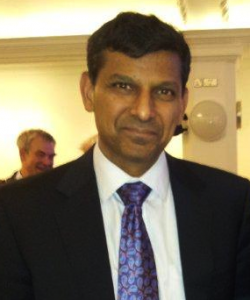On Wednesday evening I attended Professor Raghuram Rajan’s Wincott Lecture, which had the provocative title Are Capitalism and Democracy Failing Us? (He’s also written a couple of columns outlining the themes, in the FT and Project syndicate.) Professor Rajan is the author of [amazon_link id=”0691152632″ target=”_blank” ]Fault Lines[/amazon_link], a terrific and thought-provoking book about the political economy origins of the sub-prime crisis – a crisis he was one of the economists to predict publicly, in 2005. So clearly it’s worth paying careful attention to what he has to say.
[amazon_image id=”0691152632″ link=”true” target=”_blank” size=”medium” ]Fault Lines: How Hidden Fractures Still Threaten the World Economy (New in Paper)[/amazon_image]
The argument in the lecture was that there is an interaction between capitalism and democracy. In good times this is positive, the beneficial economic and political structures are mutually reinforcing. But the crisis is giving us technocracy in some countries, oligarchy in others, and these political structures are depleting the sense of fairness and trust on which democracy has to rest. There is an urgent need to restore to the middle classes a sense of opportunity, he argued.
The lecture covered the hollowing out of jobs in the middle of the labour market, the division of people into those who tell computers what to do, and those who are told what to do by the computers. Prof Rajan cited Claudia Goldin and Lawrence Katz’s book on skills, [amazon_link id=”0674035305″ target=”_blank” ]The Race Between Education and Technology[/amazon_link], and Charles Murray’s [amazon_link id=”0307453421″ target=”_blank” ]Coming Apart[/amazon_link]. He tied the problem of the squeezed middle into his own book, Fault Lines, arguing that politicians had responded to the hollowing out of the income distribution by means of credit – affordable housing, loans for consumption. In Fault Lines, this was presented as the political mechanism that paved the way for the subprime crisis. Consumption inequality did not increase as much as income inequality.
The question now is whether the technocratic policy responses we are seeing, from structural reforms in Eurozone countries to all the waves of QE, will end up only violating the quasi-property rights of those on low and middle incomes? It seems so – bondholders have been more or less entirely protected, and default avoided at almost any cost, and bank bonuses are as yet barely affected, whereas the rest of us can be sure we will get some mix of higher taxes and inflation. This mix, Prof Rajan argued, would undermine the legitimacy of capitalism and democracy.
An obvious question raised by Roger Bootle in his comment on the lecture – and in his own book ([amazon_link id=”1857885589″ target=”_blank” ]The Trouble With Markets: Saving Capitalism From Itself[/amazon_link]) which distinguishes between creative and merely distributive varieties of capitalism – is whether there is an alternative path. He agreed with much of the lecture, saying financial capitalism had become baleful in its influence. The answer, he agreed, appears to be education, although, as Professor Rajan pointed out, this is an inevitably slow response. But only an increased supply of highly skilled people can tackle the soaring skill premium and the elite society that has been shaped by the shortage of people who can tell the computers what to do.
Personally, I would add institutional and governance reform to the list – it is imperative to find policies that will have a visible impact much faster. (I talked about this in my Joseph Rowntree Foundation lecture earlier this year.) But yes, certainly education. Very few young people emerge from education systems equipped with the cognitive and non-cognitive skills they need now; indeed, a shocking number do not even have the basic skills to fill ‘low-skill’ jobs, according to employers. And its hard to be optimistic that any country has figured out for sure yet how to deliver better education. When we do, it will still take 15 or 20 years for it to affect the labour market.
So, a stimulating, but pretty depressing evening.

Professor Rajan, at the Wincott Lecture

